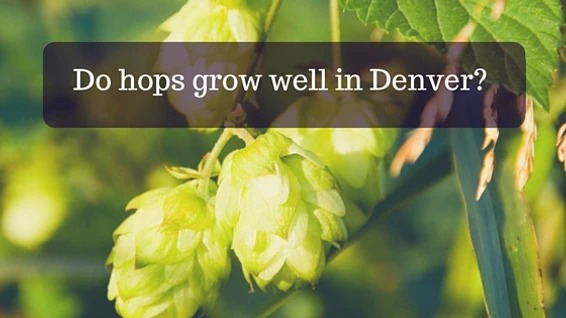Do hops grow well in Denver? Do you sell them?
– Kathy
We’re so hoppy you asked! With the increasing interest in home brewing, growing hops has become more and more popular, but even a teetotaler can appreciate their beautiful leaves and distinct fragrance.
Hops grow as a vine, so you’ll need some kind of support system, like a fence, arbor, trellis, pergola or wall. Make sure you have plenty of room. Hops grow big and they grow fast. Many hop vines can shoot up to 30 feet in no time. Choose a sunny location with protection from strong winds. Hops grow best in well-drained, rich soil. Be sure to amend the soil with an organic compost like B.O.S.S. when you’re planting.
Hops like moisture, especially in their first year. Check them regularly to keep the soil moist, but not soaking. Mulching around the plants can also help retain moisture. Hops produce lots of shoots, so prune them aggressively. Choose three or four of the healthiest vines to cultivate and prune the rest to the ground. As for fertilizer, feed your hops first with a nitrogen rich plant food early in the season, then with a bloom booster mix later in the summer. We recommend feeding with Espoma GardenTone in May and Espoma FlowerTone in June of July.
The vines will produce several harvests throughout the season. To tell if hops are ready to harvest, give the cones a little squeeze. If they feel dry and papery and spring back into shape, they’re ready to pick. If they feel soft and squeeze flat, they’re still too moist and need to dry out on the vine a little longer. Ripe hops will also have that unmistakable aroma that beer-drinkers love. Immature hops will tend to have a grassier smell. Once you harvest the hop cones, dry them out for about three days. Then you can use them right away or seal them in a freezer bag and keep them in the freezer.
One word of caution, hops can be very toxic to certain breeds of dogs. The danger seems to come mostly in consuming used hops, so always throw away used hops and don’t compost them. Most dogs are uninterested in hops on the vine, but you might want to plant them in an area the dogs can’t get into, just to be on the safe side. If you have any questions, talk with your vet.
We carry Chinook, Cascade, Golden Nugget, Summer Shandy, Bianca and Willamette hops. Supply can vary by store, so give us a call before you hop on by!

